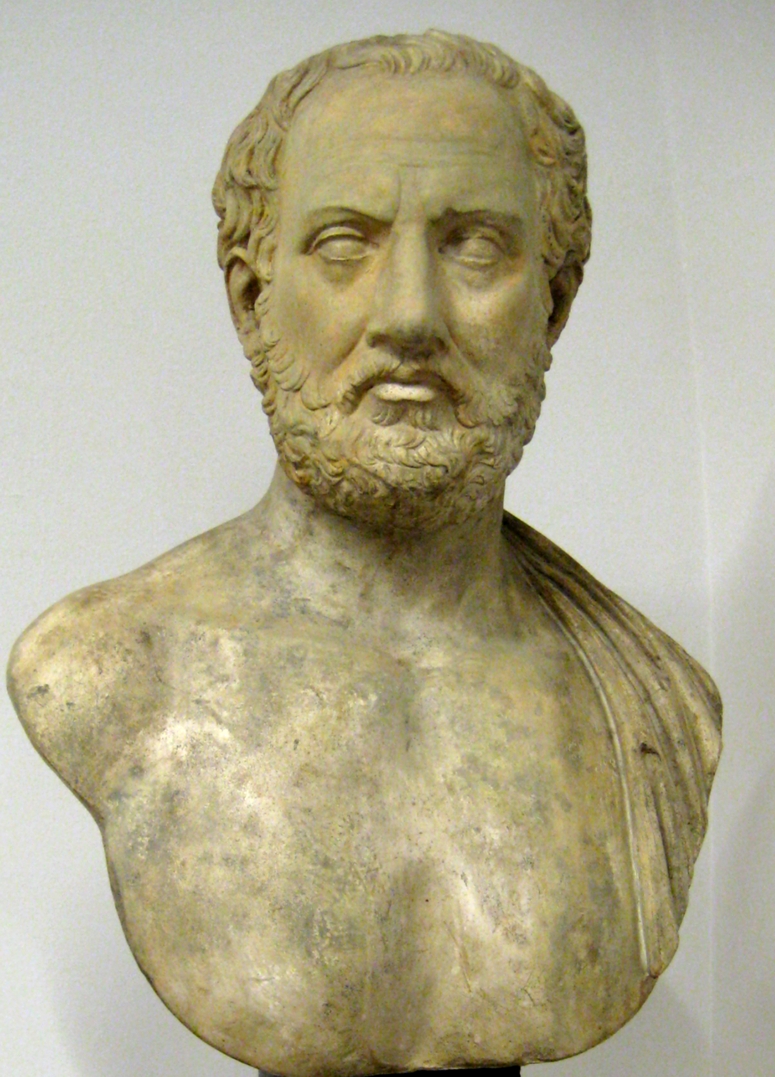Thúkýdidés nejznámější citáty
Zdroj: [Messner, Reinhold, Reinhold Messner, Cerro Torre: Tragédie na skalní jehle, Brána, Praha, 2009, 1, 253, Jaroslav Voříšek, 222, 978-80-7243-415-2]
„Totožnost zájmu je nejjistější pouto mezi státy nebo jednotlivci.“
Zdroj: BURCHILL, S. (2005): The National Interest in International Relations Theory, New York: Palgrave Macmillan, s. 15
Thúkýdidés: Citáty anglicky
“they possess most gold and silver, by which war, like everything else, flourishes.”
Book VI, 6.34; "they have abundance of gold and silver, and these make war, like other things, go smoothly" ( trans. http://www.classicpersuasion.org/pw/thucydides/jthucbk6rv2.htm Benjamin Jowett)
History of the Peloponnesian War, Book VI
Variant translations:<p>But the palm of courage will surely be adjudged most justly to those, who best know the difference between hardship and pleasure and yet are never tempted to shrink from danger. http://www.perseus.tufts.edu/cgi-bin/ptext?lookup=Thuc.+2.40.3<p>And they are most rightly reputed valiant, who though they perfectly apprehend both what is dangerous and what is easy, are never the more thereby diverted from adventuring. (translation by Thomas Hobbes http://oll.libertyfund.org/?option=com_staticxt&staticfile=show.php%3Ftitle=771&chapter=90127&layout=html&Itemid=27)<p>
Book II, 2.40-[3]
History of the Peloponnesian War, Book II
Variant translation: "...the search for truth strains the patience of most people, who would rather believe the first things that come to hand." Translation by Paul Woodruff.
Book I, 1.20-[3]
History of the Peloponnesian War, Book I
“Contempt for an assailant is best shown by bravery in action.”
Book VI, 6.34-[9]; "the true contempt of an invader is shown by deeds of valour in the field" ( trans. http://www.classicpersuasion.org/pw/thucydides/jthucbk6rv2.htm Benjamin Jowett)
History of the Peloponnesian War, Book VI
Book II, 2.40-[3]
History of the Peloponnesian War, Book II
Kontext: Again, in our enterprises we present the singular spectacle of daring and deliberation, each carried to its highest point, and both united in the same persons; although usually decision is the fruit of ignorance, hesitation of reflection. But the palm of courage will surely be adjudged most justly to those, who best know the difference between hardship and pleasure and yet are never tempted to shrink from danger. In generosity we are equally singular, acquiring our friends by conferring, not by receiving, favours.
Book II, 2.35-[1]-[3]
History of the Peloponnesian War, Book II
Kontext: I could have wished that the reputations of many brave men were not to be imperilled in the mouth of a single individual, to stand or fall according as he spoke well or ill. For it is hard to speak properly upon a subject where it is even difficult to convince your hearers that you are speaking the truth. On the one hand, the friend who is familiar with every fact of the story may think that some point has not been set forth with that fullness which he wishes and knows it to deserve; on the other, he who is a stranger to the matter may be led by envy to suspect exaggeration if he hears anything above his own nature. For men can endure to hear others praised only so long as they can severally persuade themselves of their own ability to equal the actions recounted: when this point is passed, envy comes in and with it incredulity.
Book II, 2.40-[3]
History of the Peloponnesian War, Book II
Kontext: Again, in our enterprises we present the singular spectacle of daring and deliberation, each carried to its highest point, and both united in the same persons; although usually decision is the fruit of ignorance, hesitation of reflection. But the palm of courage will surely be adjudged most justly to those, who best know the difference between hardship and pleasure and yet are never tempted to shrink from danger. In generosity we are equally singular, acquiring our friends by conferring, not by receiving, favours.
“Ignorance produces rashness, reflection timidity”
Book II, 40.3
History of the Peloponnesian War, Book II
“I have often before now been convinced that a democracy is incapable of empire…”
Book III, 3.37-[1] (Speech of Cleon..).
History of the Peloponnesian War, Book III
Book IV, 4.17-[4]
History of the Peloponnesian War, Book IV
Book V, 5.105-[2]
History of the Peloponnesian War, Book V
Book III, 3.39-[3]
History of the Peloponnesian War, Book III
Book VII, 7.57-[1]
History of the Peloponnesian War, Book VII
“here we bless your simplicity but do not envy your folly.”
Book V, 5.105-[3]
History of the Peloponnesian War, Book V
A summary of Athenian statements to the Melians, Book V, 5.89-[1]
History of the Peloponnesian War, Book V
Book I, 1.78-[3]
History of the Peloponnesian War, Book I
Book VI, 6.22-[1]
History of the Peloponnesian War, Book VI
Book I, 1.1-[1] (opening lines...)
History of the Peloponnesian War, Book I
Book VII, 7.71-[3] (See also: Fog of war..).
History of the Peloponnesian War, Book VII
Book V, 5.69-[2]
History of the Peloponnesian War, Book V
Book III, 3.46-[4]
History of the Peloponnesian War, Book III
Book I, 1.34-[3]
History of the Peloponnesian War, Book I
“the freaks of chance are not determinable by calculation.”
Book I, 1.84-[3]
History of the Peloponnesian War, Book I
Book I, 1.13-[1] (See also: Karl Marx, Grundrisse, Introduction p. 7)
History of the Peloponnesian War, Book I
Book III, 3.45-[1]
History of the Peloponnesian War, Book III
Book VI, 6.23-[2]
History of the Peloponnesian War, Book VI
Book VII, 7.75-[3]
History of the Peloponnesian War, Book VII
